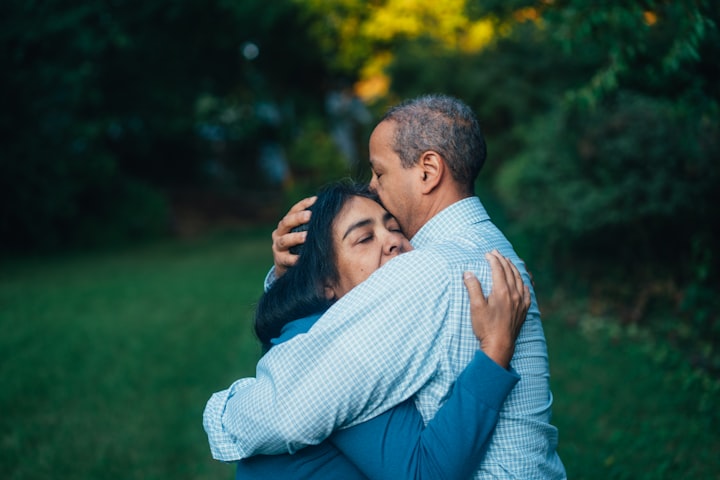Love Doesn't Cost a Thing
Be forgiving

Moving Beyond Hurt: Steps to Loving Those Who Have Wronged You
Have you ever been wronged by someone and found it hard to let go of the hurt? We've all been there. It's easy to hold onto anger, resentment, and bitterness when we feel like someone has treated us unfairly. But what if I told you that moving beyond hurt is possible? What if I told you that loving those who have wronged you can bring healing not only to your relationship but also to your heart? In this blog post, we will explore practical steps on how to love those who have hurt us and move past the pain toward a more joyful future. So grab a cup of coffee or tea, sit back, relax, and join me in discovering how forgiveness can lead us all into a brighter tomorrow.
Introduction: Understanding the Need to Move Beyond Hurt
When we experience hurt, it is natural to want to retaliate or withdraw in self-protection. However, Scripture tells us that God calls us to a higher standard. He asks us to love our enemies and pray for those who persecute us (Matthew 5:44). This is not always easy, but it is possible with God’s help.
When we harbor resentment and unforgiveness, it harms us more than it does the person who wronged us. Unforgiveness keeps us in bondage to the past and prevents us from experiencing the freedom and joy that God intends for our lives. It also damages our relationships with others and inhibits our ability to love them as Christ has loved us.
Although it may be difficult, we need to learn how to move beyond hurt so that we can experience the fullness of life that God has for us. Below are some steps that can help you on your journey toward forgiveness:
1) Acknowledge the hurt: Denying or repressing pain will only prolong its effects. Acknowledge the hurt that you feel and allow yourself to grieve the loss or betrayal. You may need to journal or talk with a trusted friend or counselor about what you are feeling in order to process it fully.
2) Identify the source of the hurt: Once you have acknowledged the pain, try to identify what (or who) caused it. This will help you determine whether the hurt was intentional or accidental
Recognizing and Acknowledging Your Feelings
It is important to be able to recognize and acknowledge your feelings in order to move beyond hurt. It can be difficult to do this, especially if you are used to pushing your emotions down or numbing yourself with alcohol or other substances. However, it is essential in order to begin the process of healing.
One way to start recognizing your feelings is to keep a journal. This can be a written journal or even a digital one on your computer or phone. Every day, take some time to write down how you're feeling. Don't worry about editing or censoring yourself, just let it all out. This will help you become more aware of the range and intensity of your emotions, and over time you may start to see patterns emerge.
Another way to become more aware of your feelings is to pay attention to your body. Our bodies often give us physical cues when we're feeling strong emotions. For example, you may feel tightness in your chest when you're angry, or butterflies in your stomach when you're nervous. If you can learn to identify these physical sensations, it can be easier to label the associated emotions.
Once you've started recognizing your feelings, it's important to acknowledge them as well. This doesn't mean that you have to act on them, but simply acknowledging that they exist can be a powerful step in moving beyond hurt. You might want to say something like "I notice that I'm feeling really angry right now" or "I
Forgiveness and Its Benefits
When we forgive those who have hurt us, we are actually doing ourselves a favor. Studies show that forgiveness can lead to physical, psychological, and social benefits. Forgiveness can lower blood pressure, reduce anxiety and depression, and lead to more satisfying relationships.
If you are holding onto anger and resentment towards someone who has wronged you, it is time to let go and move on. Learning to forgive can be difficult, but it is worth it in the end. Here are some tips for forgiving someone who has hurt you:
1. Acknowledge your feelings. It is okay to feel angry, hurt, and disappointed when someone has wronged you. Give yourself time to process these emotions before moving on to forgiveness.
2. Understand that forgiving does not mean forgetting or condoning what happened. You can still remember what happened without letting it control your life.
3. Reframe the situation in a positive light. Instead of dwelling on the negative aspects of what happened, try to focus on the good that came out of it. Maybe you learned something about yourself or grew stronger as a result of the situation.
4. Let go of your grudge. Holding onto anger and resentment will only hurt you in the long run. Forgiving those who have wronged you will help you move on with your life and find peace within yourself
Finding a Positive Perspective on the Situation
It's easy to get bogged down in negative emotions when you've been hurt by someone. But it's important to remember that everyone makes mistakes, and that doesn't make them a bad person. Instead of dwelling on the hurt, try to find a positive perspective on the situation.
Think about what you could learn from the experience. What did you do wrong? What could you have done differently? How can you prevent something like this from happening again in the future?
It's also important to forgive the person who hurt you. Holding onto anger and resentment will only make you feel worse in the long run. Forgiveness doesn't mean forgetting what happened or condoning the other person's actions. It just means letting go of your anger and moving on with your life.
Taking Practical Steps to Move On
It can be incredibly difficult to move on from hurt, especially when the person who caused that hurt is still in your life. But it is possible to forgive and move on, even if it doesn't feel like it right now. Here are some practical steps you can take to begin the process:
1. Acknowledge your feelings. It's okay to be angry, sad, or hurt. Don't try to bottle up your emotions or pretend they don't exist. Allow yourself to feel them fully so that you can eventually let them go.
2. Write down what happened. Sometimes putting your thoughts into words can help you to see the situation more clearly and start to work through your feelings.
3. Talk to someone you trust about what happened. Talking openly and honestly about what's going on can help you gain a different perspective and start to work through your emotions.
4. Make a decision to forgive. This is a personal decision that only you can make, but it is possible to forgive even if the other person doesn't deserve it or isn't sorry for what they did. Forgiving doesn't mean forgetting or excusing what happened, but it does mean letting go of anger and bitterness so that you can move on with your life.
5. Take action accordingly. If you've decided to forgive the person who hurt you, take steps to rebuild any damaged relationships if possible. If not, focus on taking care of yourself emotionally and moving
Engaging in Self-Care Activities
No one is perfect. We all make mistakes and sometimes we hurt the people we love, even if we don't mean to. If you've been hurt by someone close to you, it can be hard to forgive and move on. But holding on to anger and resentment will only make you feel worse in the long run. Luckily, there are some things you can do to help you heal from the hurt and start to love those who have wronged you.
One of the most important things you can do is to take care of yourself. When you're dealing with pain and hurt, it's easy to forget about taking care of your own needs. But if you want to move beyond the hurt, it's important that you engage in self-care activities. This could include things like exercise, journaling, spending time in nature, or doing something that makes you happy. Taking care of yourself will help reduce stress and anxiety and will allow you to better deal with difficult emotions.
It's also important that you reach out for support from family and friends. Talking about what happened and how you're feeling can be really helpful. They may not be able to fix the situation, but they can offer words of comfort and understanding. If you don't have anyone close by that you can talk to, there are also many hotlines and online support groups available that can help.
Finally, don't forget to be patient with yourself as you heal from the hurt.
Reaching Out to Loved Ones for Support
It can be difficult to move on from hurt, especially when the person who caused that hurt is someone close to you. But it is possible to forgive and even love those who have wronged you. Here are some steps to take:
1. Acknowledge your hurt. Don't try to sweep it under the rug or pretend it didn't happen. Recognize that what happened was painful and that you have a right to feel hurt.
2. Talk about what happened with someone you trust. It can be helpful to talk about your experience with someone who will understand and support you. This can help you express your feelings and start to make sense of what happened.
3. Give yourself time to heal. Don't expect to immediately forgive the person who hurt you. It takes time to work through your pain and anger. Allow yourself that time, without putting pressure on yourself to hurry up and move on.
4. When you're ready, reach out to the person who hurt you. If possible, talk to them directly about what happened and how it made you feel. If they're receptive, this can help start the process of healing for both of you. If they're not receptive, or if talking in person isn't possible or safe, consider writing a letter (even if you don't plan to send it). Getting your thoughts and feelings down on paper can be cathartic and help you further process what happened so that you can begin to let.
Conclusion: Learning How to Love Again
It is possible to forgive those who have hurt you and move on with your life. In order to do this, you need to work through the hurt that you feel. You can do this by acknowledging the pain that you feel, accepting that the other person is not perfect, and making a decision to forgive. Once you have forgiven, you can start to love again.
Click here now for a tip on healing relationships, letting go of anger,and finding peace in your life.






Comments
There are no comments for this story
Be the first to respond and start the conversation.